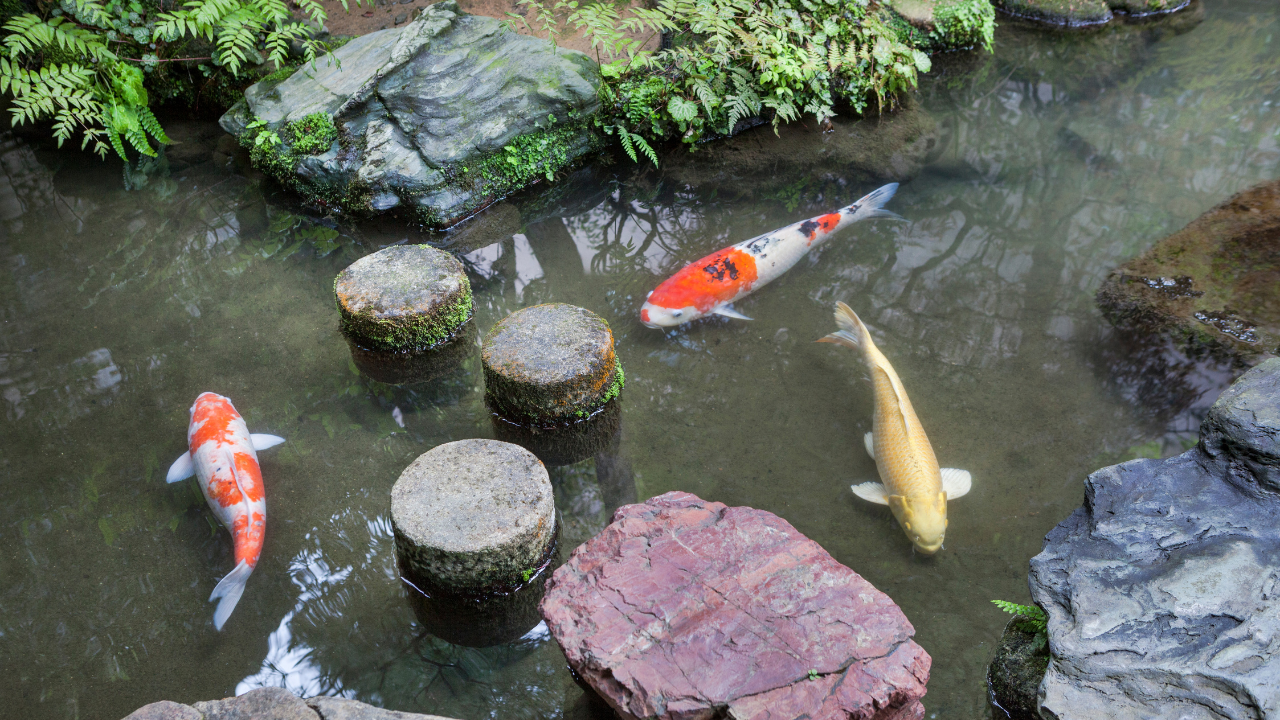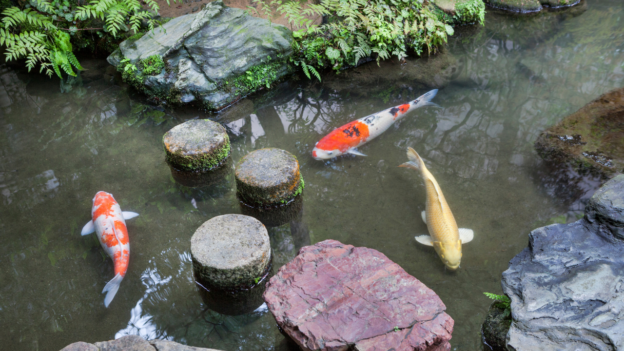
Key Takeaways:
- Maintaining a clear pond requires regular care and attention.
- Proper filtration, water circulation, UV lights, and water quality are important for a healthy pond ecosystem.
- Aquatic plants play a vital role in maintaining water clarity.
- Controlling fish populations and feeding habits helps prevent nutrient buildup.
- Regular cleaning and removal of debris are crucial for preventing cloudy water.
Owning a pond or a koi pond can be a rewarding experience. The gentle lapping of water, the sight of colorful fish, and the serene atmosphere it creates can transform your outdoor space. However, maintaining a clear and healthy pond requires consistent care and attention.
Cloudy or green water can quickly turn your tranquil oasis into a murky eyesore. But fear not! With the right knowledge and effort, you can achieve crystal-clear pond water.
In this guide, we will explain some essential steps to maintaining a clear pond ecosystem. We’ll explore various techniques – from regular cleaning to proper filtration. By following these tips and tricks, you’ll be well on your way to enjoying a sparkling clear pond all year round.
Whether you’re a seasoned pond owner or just starting, this guide will provide you with the needed help. We have added everything from ways to clean the pond to different pond maintenance ways.
Tips and Tricks for Having Crystal-Clear Pond Water
Maintaining a clear pond involves a combination of proactive measures and regular upkeep. Here are some essential tips to keep your pond sparkling:
Regularly Clean the Pond
Consistent cleaning is fundamental for a clear pond. Remove fallen leaves, debris, and dead plants. This will prevent them from decomposing and clouding the water. Skimming the surface regularly helps to collect floating particles.
Keep Limited Fish Population
Overcrowding your pond with fish means excess fish waste, which contributes to cloudy water. A balanced fish population is crucial for maintaining water quality. Consider the size of your pond when choosing the fish. And follow the recommended stocking levels for your fish species.
Regularly Check Water Parameters
Check water parameters such as pH, ammonia, nitrite, and nitrate levels to maintain a healthy pond ecosystem. With regular testing, you can identify any imbalances. This allows you to correct them in time.
Keep Aquatic Plants
Aquatic plants play a vital role in maintaining water clarity. They help oxygenate the water, absorb nutrients, and provide shelter for beneficial bacteria. A balanced plant population contributes to a clear and healthy pond.
Trim Overgrown Plants
While aquatic plants are beneficial, excessive growth can lead to problems. Trim back overgrown plants to prevent them from shading the pond and creating dead spots.
Get a Suitable Pump
A good-quality pond pump is essential for circulating water and preventing stagnation. Sufficient water circulation distributes oxygen, prevents algae growth, and improves overall water quality.
Try a Green Pond Water Treatment Solution
In case of a green water outbreak, you can use a pond water treatment solution to help clear the water. These products have algaecides or clarifying agents that target algae. And they also improve water clarity.
Control Overfeeding Fish
Overfeeding fish can lead to excess waste and nutrient buildup, promoting algae growth. Feed your fish only what they can consume within a few minutes and avoid overfeeding. This minimizes pond cleaning time and guarantees optimal water quality.
Get a Powerful Pond Water Filter
A reliable pond filter is important for removing debris, excess nutrients, and harmful particles from the water. Choose a pond filtration system that is appropriate for the size of your pond and the number of fish you have.
Pond and fountain repair Orange County helps getting the right services and supplies for your pond.
How to Choose the Right Filtration System for Your Pond?
Selecting the right filtration system is essential for maintaining clear pond water. Consider the following factors when choosing a filter:
Consider Your Pond Size
The size of your pond determines the filtration capacity you need. A larger pond requires a more powerful filter to effectively clean the water.
Check Fish Population
The number of fish in your pond affects the amount of waste produced. This impacts the filtration requirements. More fish generally require a stronger filter.
Consider the Plant Life
Aquatic plants contribute to water quality, but they also produce organic matter. A filter with enough capacity can handle the workload effectively.
Consider Water Features
Waterfalls, fountains, and streams create additional challenges for filtration. Ensure your filter can handle the increased water flow and debris associated with these features.
Beneficial Bacteria to Maintain Clear Water
Beneficial bacteria break down organic waste, maintain water quality, and prevent green water. They help to convert harmful ammonia into less toxic nitrates.
Oxygenation for Clear Pond Water
Adequate oxygen levels are essential for fish health and water clarity. Oxygenation helps to prevent algae growth, decompose organic matter, and support beneficial bacteria. Consider using a pond aerator or fountain to increase oxygen levels in your pond.
Common Reasons for Cloudy Pond Water
Cloudy pond water can be caused by several factors:
- Excess nutrients: Overfeeding fish, decaying plants, and fertilizer runoff contribute to nutrient buildup.
- Insufficient filtration: A clogged or small filter may not remove particles and debris from the water. This causes it to become cloudy.
- Algae blooms: Excessive algae growth can quickly turn pond water green and cloudy.
- Disturbed sediment: Agitating the pond bottom can release sediment into the water and make it cloudy.
How to Clear Excessive Algae Growth to Clear Pond Water?
Algae can quickly take over a pond, causing it to become green and unsightly. Here are some effective ways to control algae growth:
- Increase water circulation: A strong pump and filter prevent algae from settling in.
- Reduce nutrient levels: Limit fish feeding, remove excess plant matter, and avoid using fertilizers near the pond.
- Introduce aquatic plants: Aquatic life competes with algae for nutrients and this helps with algae control.
- Use algaecides: In severe cases, you can use algaecides specifically designed for ponds. However, use these products cautiously and follow the instructions carefully.
- Consider a UV clarifier: An ultraviolet light clarifier can help kill algae cells, preventing them from multiplying and maintaining a balanced ecosystem.
Green water, murky water, and foamy water are common pond water problems. Whether it is your backyard pond, a fish pond, or a garden pond, these tops will help you with everything.
Call OC Pond for Reliable Pond Cleaning and Maintenance Services
If you are looking for expert pond cleaning, repair, and maintenance services then Pond fountain parts and supplies Orange County helps you with finding the right equipment and supplies for your pond’s regular maintenance.
